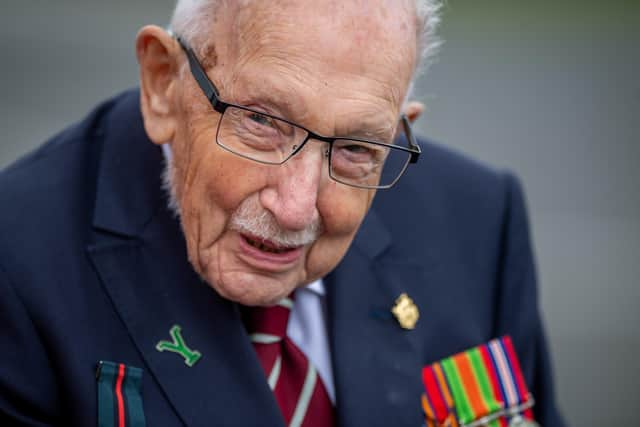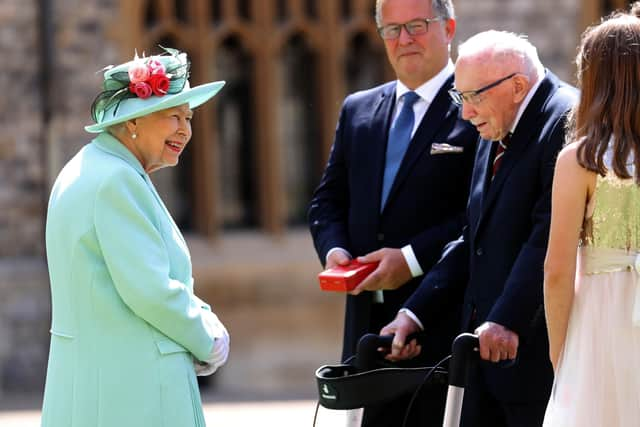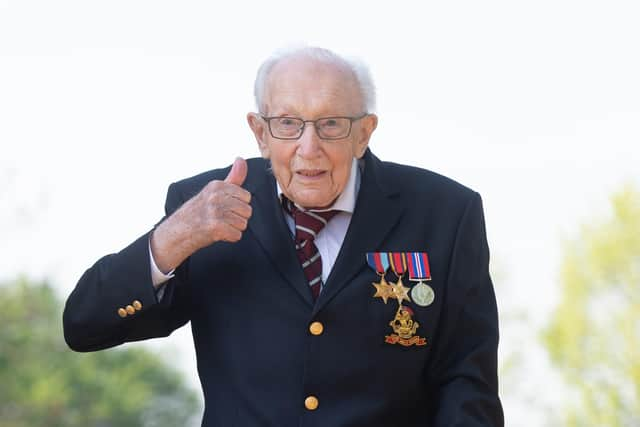How we should all honour Captain Sir Tom Moore – Jayne Dowle
And as we contemplate the sad occasion of his passing, it is clear that the nation will never forget this extraordinary man from Keighley.
Even now doctors and nurses are benefiting from the £32m he raised for NHS charities. Some has been used to create recuperation rooms for exhausted hospital workers to provide a respite from the onslaught of caring for Covid patients.
Advertisement
Hide AdAdvertisement
Hide AdIn addition, The Captain Tom Foundation, established by his family to “spread hope and ease loneliness”, is supporting a number of charities including the Royal British Legion, a cause which the Second World War veteran supported throughout his life.


The world-record beating millions Captain Tom raised will certainly make a tangible difference to deserving causes. Donations are also being given to the mental health charity Mind and hospices. This is especially poignant as all charity fundraising has been affected by coronavirus restrictions.
However, whilst he will stand as an inspiring figurehead for public-spirited endeavour, Captain Tom represents much more than colossal sums of money raised. His long and interesting life, from those early years growing up on the edge of the Yorkshire Dales to the proud grandfather he became, provide us with invaluable insight into the resilience of his generation.
When I read his autobiography, Tomorrow Will Be A Good Day, I was struck by how it shone a light on decades of British social history from the viewpoint of a man who sought no fame or glory, nor waved any political flag.
Advertisement
Hide AdAdvertisement
Hide AdThere were millions of young men and women like Thomas Moore, born in the shadow of the First World War, whose lives were turned upside by world events they had no control over.


As a grammar school boy from a family of Yorkshire builders, Captain Tom’s story provides a fascinating social document of a time just in living memory, but almost unrecognisable to today’s young people.
Imagine being conscripted from your engineering apprenticeship, as the young Tom was in 1940, and sent to Cornwall to begin your military service. As tumultuous events engulfed the world throughout the 20th century, people like this young man, good people from decent homes, found themselves at the eye of the storm. “Being conscripted didn’t do me any harm at all,” he said.
The privations this generation endured, and the uncertainty of what would happen when the pivotal experience of military service ended, should provide today’s youngsters with vital context. He eventually settled down to a life in business – he was managing director of a concrete company – and a brief brush with fame as a contestant on the BBC’s Blankety Blank in 1983.
Advertisement
Hide AdAdvertisement
Hide AdWhen in early April 2020, Captain Tom started walking 100 laps of his garden to return a debt of gratitude to the nurses and doctors who treated him for cancer and a broken hip, he could never have imagined he would become a global figure of hope.


Cross-cultural, non-denominational and universal, as a venerable elderly man he was a touchstone for all cultures. That coronavirus was a contributory factor to his death made his life even more significant to the millions who have lost their own loved ones to the disease. On the news of his passing three days after being admitted to hospital, tributes poured in from around the world. Even President Joe Biden and the White House paid tribute to the man “who inspired millions through his life and his actions”.
And he did. Choosing words which echoed the solidarity of the Second World War, in one TV appearance Captain Tom sought to reassure: “To all those people who are finding it difficult at the moment – the sun will shine on you again, and the clouds will go away.”
Coming from certain prominent public figures, this would perhaps have sounded trite. Yet, amongst all the millions of words of rhetoric we have heard from politicians, experts and air-time hogs these past 12 months, the centenarian’s clear and simple words hit home.
Advertisement
Hide AdAdvertisement
Hide AdWith 100 years of life experience behind him, Captain Tom was certainly qualified to comment. He lived out his days in the glow of a loving family, but as his biography revealed, he had experienced darkness and sadness. His first marriage ended in divorce in the 1960s, at a time when respectable middle-class Yorkshiremen would still have been castigated for such an action.
In a world often besieged by ‘fake news’, he rose above the terrible divisions which have torn people apart in the pandemic and spoke from the heart. Captain Tom’s motto was “tomorrow will be a good day”. If we want to give him the legacy he deserves, we should look forward in his honour. And we will.
Support The Yorkshire Post and become a subscriber today. Your subscription will help us to continue to bring quality news to the people of Yorkshire. In return, you’ll see fewer ads on site, get free access to our app and receive exclusive members-only offers. Click here to subscribe.
Comment Guidelines
National World encourages reader discussion on our stories. User feedback, insights and back-and-forth exchanges add a rich layer of context to reporting. Please review our Community Guidelines before commenting.